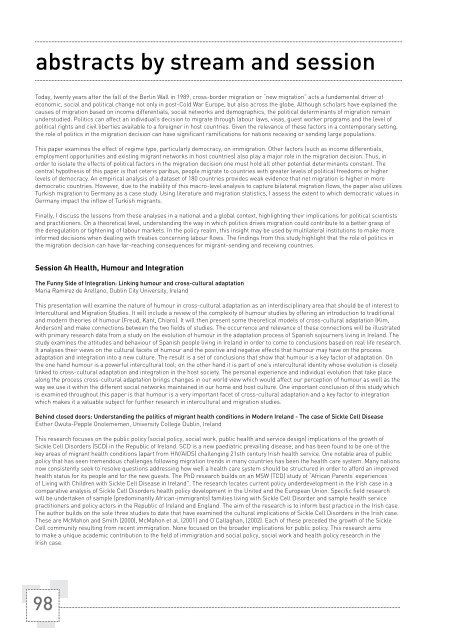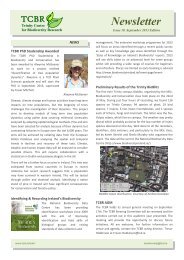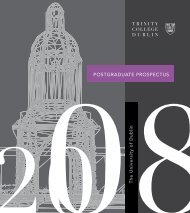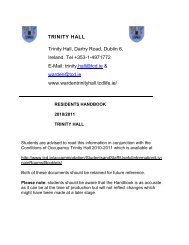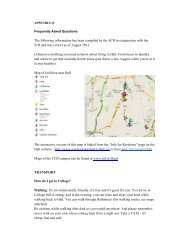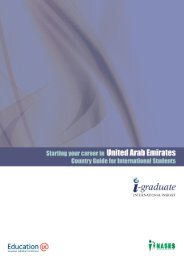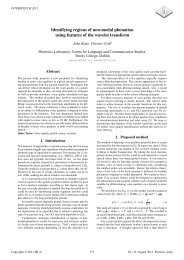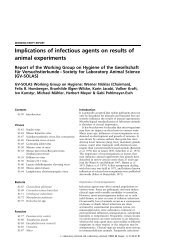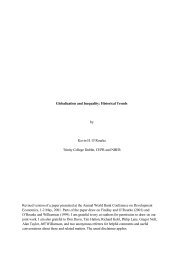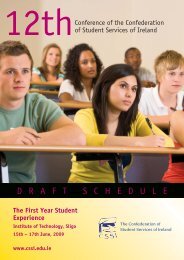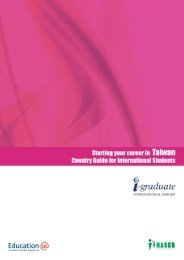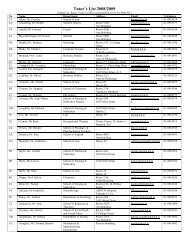Conference Programme (PDF, 1019KB) - Trinity College Dublin
Conference Programme (PDF, 1019KB) - Trinity College Dublin
Conference Programme (PDF, 1019KB) - Trinity College Dublin
Create successful ePaper yourself
Turn your PDF publications into a flip-book with our unique Google optimized e-Paper software.
abstracts by stream and session<br />
Today, twenty years after the fall of the Berlin Wall in 1989, cross-border migration or “new migration” acts a fundamental driver of<br />
economic, social and political change not only in post-Cold War Europe, but also across the globe. Although scholars have explained the<br />
causes of migration based on income differentials, social networks and demographics, the political determinants of migration remain<br />
understudied. Politics can affect an individual’s decision to migrate through labour laws, visas, guest worker programs and the level of<br />
political rights and civil liberties available to a foreigner in host countries. Given the relevance of these factors in a contemporary setting,<br />
the role of politics in the migration decision can have significant ramifications for nations receiving or sending large populations.<br />
This paper examines the effect of regime type, particularly democracy, on immigration. Other factors (such as income differentials,<br />
employment opportunities and existing migrant networks in host countries) also play a major role in the migration decision. Thus, in<br />
order to isolate the effects of political factors in the migration decision one must hold all other potential determinants constant. The<br />
central hypothesis of this paper is that ceteris paribus, people migrate to countries with greater levels of political freedoms or higher<br />
levels of democracy. An empirical analysis of a dataset of 180 countries provides weak evidence that net migration is higher in more<br />
democratic countries. However, due to the inability of this macro-level analysis to capture bilateral migration flows, the paper also utilizes<br />
Turkish migration to Germany as a case study. Using literature and migration statistics, I assess the extent to which democratic values in<br />
Germany impact the inflow of Turkish migrants.<br />
Finally, I discuss the lessons from these analyses in a national and a global context, highlighting their implications for political scientists<br />
and practitioners. On a theoretical level, understanding the way in which politics drives migration could contribute to a better grasp of<br />
the deregulation or tightening of labour markets. In the policy realm, this insight may be used by multilateral institutions to make more<br />
informed decisions when dealing with treaties concerning labour flows. The findings from this study highlight that the role of politics in<br />
the migration decision can have far-reaching consequences for migrant-sending and receiving countries.<br />
Session 4h Health, Humour and Integration<br />
The Funny Side of Integration: Linking humour and cross-cultural adaptation<br />
Maria Ramirez de Arellano, <strong>Dublin</strong> City University, Ireland<br />
This presentation will examine the nature of humour in cross-cultural adaptation as an interdisciplinary area that should be of interest to<br />
Intercultural and Migration Studies. It will include a review of the complexity of humour studies by offering an introduction to traditional<br />
and modern theories of humour (Freud, Kant, Chiaro). It will then present some theoretical models of cross-cultural adaptation (Kim,<br />
Anderson) and make connections between the two fields of studies. The occurrence and relevance of these connections will be illustrated<br />
with primary research data from a study on the evolution of humour in the adaptation process of Spanish sojourners living in Ireland. The<br />
study examines the attitudes and behaviour of Spanish people living in Ireland in order to come to conclusions based on real life research.<br />
It analyses their views on the cultural facets of humour and the positive and negative effects that humour may have on the process<br />
adaptation and integration into a new culture. The result is a set of conclusions that show that humour is a key factor of adaptation. On<br />
the one hand humour is a powerful intercultural tool; on the other hand it is part of one’s intercultural identity whose evolution is closely<br />
linked to cross-cultural adaptation and integration in the host society. The personal experience and individual evolution that take place<br />
along the process cross-cultural adaptation brings changes in our world view which would affect our perception of humour as well as the<br />
way we use it within the different social networks maintained in our home and host culture. One important conclusion of this study which<br />
is examined throughout this paper is that humour is a very important facet of cross-cultural adaptation and a key factor to integration<br />
which makes it a valuable subject for further research in intercultural and migration studies.<br />
Behind closed doors: Understanding the politics of migrant health conditions in Modern Ireland - The case of Sickle Cell Disease<br />
Esther Owuta-Pepple Onolememen, University <strong>College</strong> <strong>Dublin</strong>, Ireland<br />
This research focuses on the public policy (social policy, social work, public health and service design) implications of the growth of<br />
Sickle Cell Disorders (SCD) in the Republic of Ireland. SCD is a new paediatric prevailing disease, and has been found to be one of the<br />
key areas of migrant health conditions (apart from HIV/AIDS) challenging 21sth century Irish health service. One notable area of public<br />
policy that has seen tremendous challenges following migration trends in many countries has been the health care system. Many nations<br />
now consistently seek to resolve questions addressing how well a health care system should be structured in order to afford an improved<br />
health status for its people and for the new guests. The PhD research builds on an MSW (TCD) study of “African Parents’ experiences<br />
of Living with Children with Sickle Cell Disease in Ireland”. The research locates current policy underdevelopment in the Irish case in a<br />
comparative analysis of Sickle Cell Disorders health policy development in the United and the European Union. Specific field research<br />
will be undertaken of sample (predominantly African-immigrants) families living with Sickle Cell Disorder and sample health service<br />
practitioners and policy actors in the Republic of Ireland and England. The aim of the research is to inform best practice in the Irish case.<br />
The author builds on the sole three studies to date that have examined the cultural implications of Sickle Cell Disorders in the Irish case.<br />
These are McMahon and Smith (2000), McMahon et al. (2001) and O’Callaghan, (2002). Each of these preceded the growth of the Sickle<br />
Cell community resulting from recent immigration. None focused on the broader implications for public policy. This research aims<br />
to make a unique academic contribution to the field of immigration and social policy, social work and health policy research in the<br />
Irish case.<br />
98


